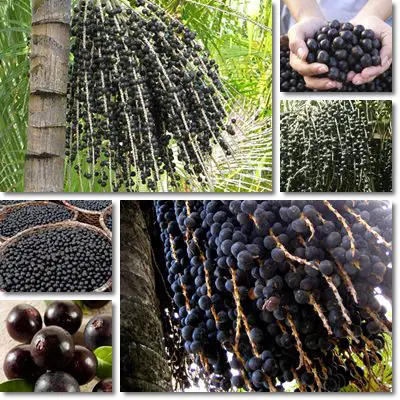The famous acay berry is the fruit of the acay palm (Euterpe oleracea), a tall palm tree native to the Amazonian basin. Acay berries have gained considerable popularity for some time now due to their high antioxidant and healthy fatty acid content. Studies suggest that this exotic Amazon berry is a powerful anticancer and anti-inflammatory agent with beneficial effects on cardiovascular health in particular.
Most of the benefits of the berry are a result of the anthocyanins antioxidants responsible for their dark purple color.
Tribal medical practices stemming from the teachings of indigenous Amazonian populations recommend acay berries for the treatment of diarrhea, intestinal parasitic infestations, ulcers and fever. Research suggests the berries exhibit beneficial effects on the immune function and circulatory system and may help in the prevention of a variety of inflammatory, degenerative, chronic diseases.

What are acay berries?
Acai or acay berries are the fruit of the acay palm tree. Acai berries are used as food, as raw material for dietary supplements such as acai berry supplements and to make acai juice. Acai berry-based supplements and food products are considered functional foods, that is, foods that promote good health.
What do acay berries look like?
Acay berries are small, round fruit with a shiny dark purple or red-purple skin. They have a tiny stem at one end and a sort of light brown tuft at the other. Both are usually removed before the berries are sold. If you ask me, acay berries look very much like perfectly round, grape-sized purple plums. The purple color of the fruit is the result of a high content of anthocyanins, natural pigments of great antioxidant value.
There is also a variety of ‘white acai berry’ which is, in fact, green. The white acai berries do not develop purple pigmentation, likely due to a recessive gene occurring naturally in the species.
What does the acay berry taste like?
Being a tropical fruit, the acay berry has a trademark refreshing, tropical fragrance. It has a pleasant, sweet taste, but not sweet in the sense of candy-sweet. Acay berries are actually low in sugar and contain some of the polyphenols also found in cocoa beans so you may experience a remnant trace of dark chocolate after chewing on some berries. Fresh acai berries contain very little edible pulp overall.
Most of the weight is taken up by seeds which are discarded, hence the consumers’ preference for byproducts such as acay (acai) berry juice or acay (acai) berry oil.
Although the acay berry fruit has gained huge popularity under the label ‘superfood’, the truth is there isn’t sufficient research to justify some of the health benefits it has been attributed. But while it’s definitely not a universal cure for cancer and other forms of chronic disease, including it into your diet might help improve nutritional status and provide some benefits owing to the fruit’s high antioxidant content.

When part of a healthy, natural diet, evidence suggests that antioxidant-rich foods such as acai berries may trigger natural healing mechanisms that may potentially reduce risks for chronic illnesses such as cancer or heart disease. However, one food does not balance out an overall poor diet or erase years of poor eating, so when looking to improve your health, understand that everything you eat matters.
What are acai berries good for?
Find out below the real health benefits of acay berries and their byproducts:
Great natural anti-inflammatory
Acay berries contain powerful antioxidants known as tannins, which are famous for their impressive anti-inflammatory activity. Research has revealed high inflammation levels often accompany chronic conditions such as diabetes, cardiovascular disease and cancer. Treating inflammation is a first step towards the prevention of chronic illness.
Anti-carcinogenic activity
Carcinogens are natural or synthetic (man-made) substances that damage normal, healthy cells and cause them to turn into cancer cells. Ellagic acid, a potent compound found in the acay berry, prevents certain carcinogens such as nitrosamines from food from binding to our DNA and causing cancerous formations. Regular consumption of the berries thus constitutes an important factor in the prevention of certain forms of cancer.
Promotes cardiovascular health
Acay berries contain Omega-9 and Omega-6 fatty acids in the form of oleic acid and linoleic acid. These healthy monounsaturated and polyunsaturated fatty acids help reduce LDL (bad) cholesterol levels and increase HDL (good) cholesterol levels, thus contributing to healthier arteries and a healthier heart. Unfortunately, the berries also contain moderate amounts of a not-so-healthy saturated fatty acid known as palmitic acid, which is why it might be best not to consume excessive amounts of the fruit.
Excellent skin moisturizer
Acay berries are about 30% fat (a pretty high percentage for a fruit indeed). This makes it possible to obtain acai (acay) berry oil, a very popular and quite efficient skin moisturizer which keeps skin moisturized, radiant and toned. Acay beery oil can be found in a variety of beauty and skin care products ranging from body lotions, skin body butter to hair masks and nail and cuticle replenishing oils.
Anti-aging food
Acay berries are a rich source of antioxidants such as anthocyanins and proanthocyanidins. The latter, for example, have proven very efficient in regulating the production of collagen and elastin, two proteins which help skin maintain its wrinkle-free, youthful appearance and resume shape after being stretched (with lots of smiles).
Other health benefits
Proanthocyanidins found in acai berries, but also grapes and cranberries have been shown to reduce the frequency of urinary tract infections, duration and severity.
Acai berries in folk medicine
Indigenous tribes of the Amazon use decoctions made from acay berries and ground seeds and used them as natural remedies for the treatment of diarrhea, fever, intestinal parasites, stomach ulcers, even malaria and various liver problems.
Conclusion
What we know for sure up to this point is that acay berries are healthy and a lot of their benefits are owed to antioxidant pigments called anthocyanins. However, it is not a ‘superfood’ and it doesn’t turn around years of bad lifestyle and dietary choices. What is certain is that blackberries, black raspberries, blueberries, aronia or chokeberry, black mulberries and other blue-purple fruits are just as healthy as acay berries, easier to find and much cheaper options and can provide similar nutrition and benefits.
